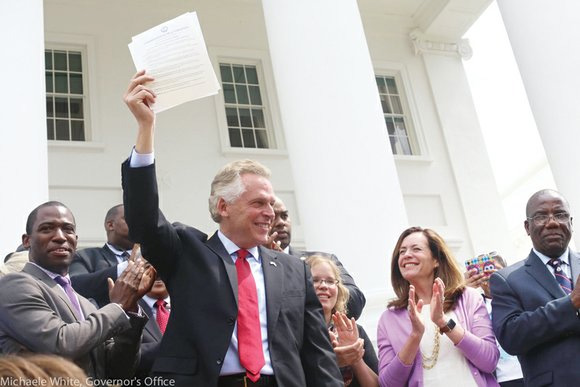Republicans file suit to rescind rights restoration to 206,000 Virginians

Gov. McAuliffe celebrated the day he announced restored rights for 206,000
felons. Now, a court could reverse his executive action.
By Jeremy Lazarus
Trice Edney News Wire
Democratic Gov. Terry McAuliffe is facing a court fight over his April 22 order restoring voting rights to 206,000 felons who have completed their sentences, including about 40,000 people convicted of violent offenses.
In a case filed Monday, Republican leaders in the General Assembly and four voters have asked the Virginia Supreme Court to find the governor acted illegally and to order him to rescind the blanket restoration of rights that allowed the affected individuals to vote, serve on juries and run for office.
Currently, 4,935 people across the state whose rights were restored have registered to vote, a barely noticeable percentage among the Virginia’s 5.3 million registered voters.
Legal experts say the case will test whether the governor can automatically restore felons’ voting rights without receiving individual requests.
Previous governors said they could restore rights only on a case-by-case basis, although Gov. McAuliffe’s immediate predecessors, Republican Gov. Bob McDonnell and Democratic Gov. Tim Kaine, streamlined restoration to make it virtually automatic for nonviolent felons — a move the legislature did not oppose.
The case also will test whether the governor can restore rights for felons who have not paid court-ordered restitution and fines, fees and other costs that have long been regarded as part of a sentence.
The more than 200,000 people whose rights were restored had completed their prison sentences, including any supervised parole or probation.
Gov. McAuliffe is the first to separate court debts from restoration of rights. He began doing so in 2015, and expanded that effort in his order last month under which he restored rights, but left intact the debts the individuals still might owe to a court.
In response to the suit, Gov. McAuliffe quickly vowed to “vigorously oppose” it, claiming he has “ample authority to restore the rights of people who have served their time.”
He called the lawsuit “simply the latest Republican attack on the voting rights of qualified Virginians who deserve a voice in their society.” He noted that most states allow felons who have served their time to register and vote.
However, the challengers argue they are mounting the suit because the governor has overstepped his authority. The plaintiffs include House Speaker William J Howell, R-Fredericksburg; Senate Majority Leader Thomas K. Norment, R-Williamsburg; William C. Cleveland, a former Republican vice mayor of Alexandria; and two voters from Southwest Virginia and one from Northern Virginia, who list themselves as Republicans.
The issue blew up, in large measure, because the governor’s order also covers violent felons, who previously faced a long wait time and further review to get their rights restored after convictions of murder, rape, robbery and similar crimes.
So far, fewer than 2 percent of felons whose rights were restored under the governor’s order have registered to vote. Still, opponents believe the governor went too far.
“The governor simply may not, with a stroke of the pen, unilaterally suspend and amend the Virginia Constitution,” Speaker Howell stated in announcing the suit. In his view, the governor’s blanket order violates provisions of the state Constitution that define a voter and authorize the governor to restore rights at his discretion.
“Gov. McAuliffe exceeded the authority granted to him, and we simply cannot ignore this unprecedented executive overreach,” Speaker Howell stated.
“A plain reading of the Constitution, 240 years of practice and precedent-setting Virginia Supreme Court cases,” Speaker Howell continued, “lead to the unambiguous conclusion that the governor’s order is unconstitutional and cannot stand.”
Sen. Norment went even further, describing the governor’s order as an “abuse of power” and asserting that “the governor has willfully ignored constitutional limitations on his power, demonstrating his complete and total disregard for the Commonwealth, the people of Virginia and the principles of representative government.”
However, restoration of rights advocates, as well as Democrats in the legislature, rushed to the governor’s defense.
Linda Thomas, president of the nonpartisan state NAACP, expressed “disappointment” in the Republican decision to file the lawsuit, saying the civil rights group “has been persistent in advocating for the restoration of rights to those who have paid their debt to society.”
House Minority Leader David Toscano, D-Charlottesville, called the suit another Republican “attempt to strip away voting rights from hundreds of thousands of Virginians. Virginians who have made mistakes, served their time and returned should have the right to fully participate in their communities.”
Delegate Charniele Herring, D-Alexandria, chair of the House Democratic Caucus, praised the governor for using his authority to restore rights and described the lawsuit as another example of Virginia Republicans “working to put barriers in front of people who are legally allowed to vote.”






